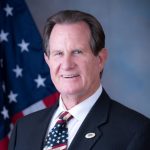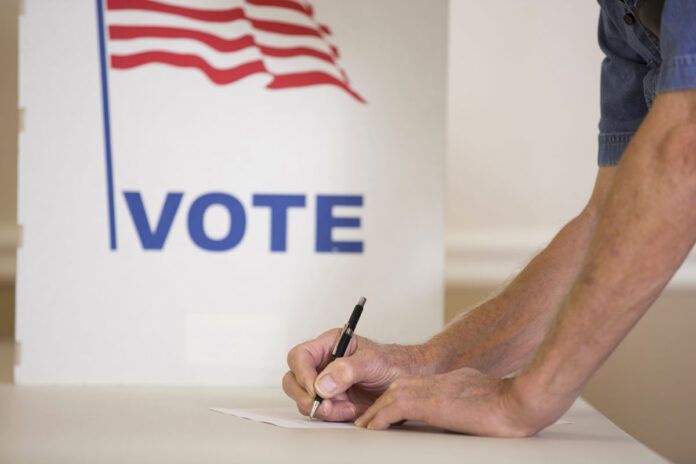Ron Morrison, 72, served on the National City council from 1992 to 2006, as mayor from 2006 to 2018 and was elected again as city council member in 2018. He’s now making a repeat run for the mayoral seat against incumbent Alejandra Sotelo-Solis and fellow council member Jose Rodriguez.
His campaign donations are on the larger side, including a $1,000 donation from former City Council candidate Richard Higley, $999 from restaurant group J-Fat and $999 from Pier 32 Marina Manager Greg Boeh.

If elected, Morrison said he would do “a number of things” to reduce homelessness throughout the city but would primarily lean on the county to provide financial support.
“For years, people have seen a problem with homeless who aren’t from National City to be honest with you,” Morrison said.
Ten to 15 years ago, he noticed television advertising while traveling through the midwest encouraging people to seek homeless solutions in San Diego county, who first landed downtown but, he believes, were then pushed south when the East Village was redeveloped.
However, statistics collated by the Regional Task Force on Homelessness indicate National City’s homeless count does not appear to have changed much in nearly a decade..
Morrison said he frequently talks with residents including homeless people and has encountered many people who aren’t from the city.
“I used to know them all because they were locals, now I’m getting to meet people from all over the United States,” Morrison said, as well as people with different backgrounds and different needs.
Regardless of where they are from, Morrison said he has gone out with volunteers to gather trash near homeless encampments and conditions are unacceptable with rats running out from underneath tents during cleanup sessions.
“You’ve got different categories of homeless: drug addicted, chronically homeless,” Morrison said and the county has a responsibility to take care of them because they receive funding for health and welfare services.
Although he acknowledged the county has “done a bit more over the past few years,” he said their efforts are nowhere near what they could be doing.
“They keep wanting to say we need to train our police to take care of things but I’m sorry, that’s their job to help the homeless,” Morrison said.
City staff has had “somewhat limited success” in partnering with outside, nonprofit agencies but he is eager to see the city hire its first homeless coordinator later this year.
“That person will work within our department to coordinate things and also go out into the community to homeless encampments. We think bringing it in house will lead to better coordination,” Morrison said, but did not specify what policies he might coordinate with that new hire to reduce homelessness if he is elected as mayor.
Citing recent success with San Diego Rescue Mission, which is currently redeveloping the former South Bay Community Church into a transitional center with 160 beds, Morrison said he has taken to social media to stave off public criticism.
“There has been some backlash because people felt it would bring trash but I’ve gone on social media and started explaining” how it will function and garnered support for the facility.
High housing costs and job loss have also pushed some residents to the streets, he said— although they are easier problems to address on an individual level, the challenge of developing affordable housing is a larger issue.
“National City is being woefully mistreated and put in a bad light,” Morrison said with unrealistic housing numbers assigned by the state.
While serving on the San Diego Association of Governments’ board, Morrison said he advocated for fewer houses to be required in National City because it has less land on which to build.
“The six most affluent cities in our county have over 75 square miles of land. National City has 7.2 miles. Other cities were assigned a little over 3,000 homes to build. National City was assigned over 5,000 in the next six years. I’ve spoken heavily against it,” Morrison said.
On the other hand, he said SANDAG did recognize National City has a supply of low income and affordable housing but is lacking in moderate and above moderate housing.
“There is limited space for us to build and I can count most of the vacant lots on all my fingers so new housing needs to be single-family, high rise, high density housing. The only thing we can do is tear down existing buildings and businesses to build more,” Morrison said but “businesses provide the revenue for services for people who live here now” and reducing services for low income residents is shortsighted.
The PARCO development is successful, he said and he anticipates a section of shared city property alongside the now-defunct Trophy Lounge will ultimately be developed as affordable housing in some capacity, a project that will likely take shape under the next mayoral term.
However, he said the bottom line is it has to be more realistic for developers to build affordable housing.
“People don’t understand if a unit costs, say $400,000 to build and you want to rent or sell it for $100,000 then nobody is going to want to build that. We need to make it more realistic,” Morrison said.
Anecdotally, he has heard feedback suggesting residents have been pushed out of the city due to rent prices but thinks the trend is for young families to move to Eastlake and Otay Ranch where they can live a more affluent lifestyle in a larger home while National City maintains rentals at some of the lowest prices in the county.
At the same time, he said “it’s on us as leaders to help guide our young people into reasonable expectations” as he sees many people pursue careers that might not afford them the income to live in the San Diego region.
Generally, he said, nobody is putting it all together: the city can’t subsidize every development, there isn’t enough room to build, people have to earn enough to pay for housing and developers have to anticipate a profit or they won’t move forward with projects.
If elected, he would consider bringing back a program where the city helps first-time homeowners buy their mortgage insurance. Doing that would lower their monthly payments substantially, he said, so more people would qualify for a loan and have more cash in the bank each month.
“The other thing is: whenever we have the opportunity to give input, we ought to ensure apartments are built to condo specifications because the market is soft. There’s no place to build single family homes or duplexes but apartments can be built to condo specs so when the market turns they can be sold affordably with no retrofitting,” Morrison said.
The downtown specific plan allows for a lot of construction, he said, if the state requirement of no more than six units on one piece of property can be circumvented to allow for dense housing.
“I want to be realistic on how we move forward with different types of housing. If you only have low income housing, you end up with only low income jobs in the area. People tell me how they want things like a Trader Joe’s market but businesses like that aren’t going to come somewhere with nothing but low income jobs and housing. If you allow for median and above median then everybody benefits from that mixture,” Morrison said.
The city needs to relentlessly seek out more businesses to invest into the city, he said, including large companies.
“We’ve got to be business-friendly, we can’t have an anti-corporate attitude. Local, small businesses are nice if you have a bedroom community but we have a city that demands a lot of services and the bulk of city revenue comes in from larger businesses,” Morrison said.
At the same time, he said, the city needs to give extra support to local, brick-and-mortar businesses by considering them first for local grants.
“It’s hard being a small business owner in this area. When we say we’re going to give out business grants and they all go to non profits— that’s not helping our local businesses,” Morrison said, and he would rather that funding go toward projects like façade and store improvements.
The city can’t solicit developers to come in without working on “curb appeal like you’re selling a house” so the prospect of building in National City is enticing, he said.
“We need to spend the money we have the right way and make sure we do things out in the community from picking up an old couch to fixing potholes. We’ve lost our community pride and you can’t bring business in without pride,” Morrison said.
One thing he would reduce, if elected: spending taxpayer money on large scale events.
Over the past four years, he said, the city has shifted from relying on volunteers to mount events, to funding and developing the events. Some were canceled for the pandemic with funding shifted to slush accounts, he said, while others have turned into political events for elected officials.
“I also think we need to look at how we distribute our funds. Just because someone supports me in an election doesn’t mean they get funds. My deal is if someone comes before me, I treat you like any other applicant yet we seem to have a lot of special treatment,” Morrison said.
Along the same lines, he’d like to revisit how people are appointed to committees so only people who are truly qualified to serve are tapped for a seat.
Finally, he wants to push for more citizen involvement.












